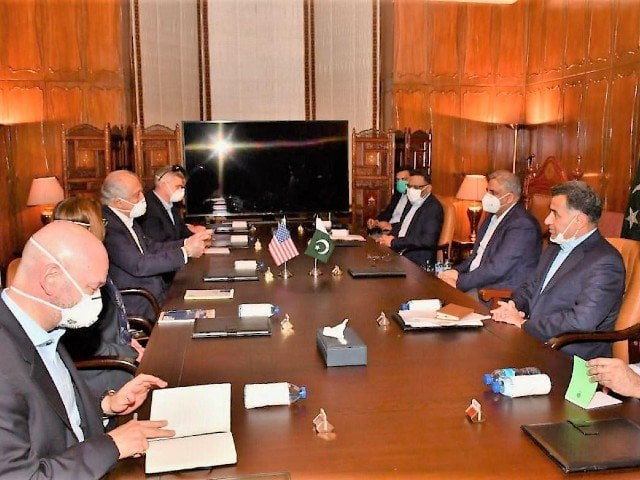US top envoy meets COAS, ISI chief to discuss Afghan peace
ISPR says both agreed to continue working towards mutually agreed goals

ISPR says both agreed to continue working towards mutually agreed goals. PHOTO: ISPR
Zalmay Khalilzad, despite Covid-19 that otherwise restricted official engagements, is travelling to Islamabad, Doha and Kabul. His tour suggests the importance the Trump administration still attaches to the Afghan peace deal despite pandemic and anti-racism protests in the US.
Afghan govt frees Taliban prisoners as truce holds for second day
Khalilzad, who was accompanied by senior American officials, met army chief General Qamar Javed Bajwa was assisted by Director General Inter-Services Intelligence (ISI) Lt-Gen Faiz Hameed and other senior security personnel.
An official handout issued by the military's media wing, Inter-Services Public Relations (ISPR), said that during the meeting matters of "mutual interest, overall security situation including Afghan refugees issue and Afghan reconciliation process and Pak-Afghan border management" were discussed.
"Both shared steps taken in this regard and agreed to continue working towards mutually agreed goals," the statement concluded.
Although, no further details were available, but it is believed Khalilzad's latest visit was aimed at discussing the next steps in the fragile peace efforts.
The US and Afghan Taliban signed a landmark deal in February that envisaged a roadmap for the political solution to the long war in Afghanistan. The key clause has been the prisoners' exchange between the Afghan government and the Taliban. The prisoners' swap was to take place within days of the signing of US-Taliban deal but the process hit a roadblock when Afghan President Ashraf Ghani refused to free 5,000 Taliban inmates in one go. The deadlock prevented the start of crucial intra-Afghan talks, which were originally to take place in the second week of March.
Govt appoints Muhammad Sadiq as country’s first special representative for Afghanistan
What further compounded the process was internal wrangling between President Ghani and his political rival Dr Abdullah Abdullah. However, a power-sharing deal had been reached recently where Dr Abdullah has been made head of the Afghan government delegation to participate in the intra-Afghan dialogue. Also, there has been positive movement on the prisoners' exchange, renewing hopes for early start of intra-Afghan talks.
The US is thought to have been requesting Pakistan to play its part in convincing the Taliban for a permanent ceasefire.
On Saturday, Pakistan also appointed a focal person for the Afghan peace process. Muhammad Sadiq, the former ambassador to Kabul, has been appointed as special representative on Afghanistan.
Although the Foreign Office did not talk about his mandate, sources say he will spare head Pakistan efforts on the Afghan reconciliation process.



















COMMENTS
Comments are moderated and generally will be posted if they are on-topic and not abusive.
For more information, please see our Comments FAQ